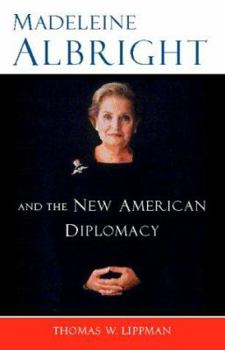Madeleine Albright and the New American Diplomacy
Select Format
Select Condition 
Book Overview
Selected by President Clinton as the first woman to be Secretary of State, Madeleine Albright rode into office on a wave of popularity. She was an instant celebrity in Washington and around the world, recognized everywhere and widely admired for her blunt style and dramatic personal history. Facing a Congress controlled by the opposition and an unruly world where the rules of the Cold War no longer applied, this tough-talking grandmother and Democratic...
Format:Hardcover
Language:English
ISBN:0813397677
ISBN13:9780813397672
Release Date:June 2000
Publisher:Basic Books
Length:368 Pages
Weight:0.95 lbs.
Dimensions:1.0" x 6.1" x 9.3"
Customer Reviews
2 ratings
Balanced & Insightful
Published by Thriftbooks.com User , 22 years ago
Lippman's biography is balanced, fair and an enjoyable read. You'll come away with a clear sense of Albright's strengths and special qualities as well as her weaknesses as a leader. You'll learn how her style differs from that of Christopher and Powell. I would have liked a little more clarity and depth on how she justified women's issues as a foreign policy imperative. Her comments about enslavement of women and the likelihood of war under women political leaders hinted at her views. I suspect, however, there's more to her arguments than the book covered. Albright's perspective and the national security establishment's reaction to it may color our relations with Arab allies, the Chinese and other important global players. I also would have liked to explore more how her personal history influenced her views on the Middle East. Lippman kept mentioning that Albright showed unusually little compassion for Palestinians yet I never learned why.
A Lippmanese Nutshell of Albright's Diplomatic Challenges
Published by Thriftbooks.com User , 24 years ago
"Madeleine Albright and the New American Diplomacy" is a seasoned reporter's lensview of "classic Albright" and the political, cultural and diverse complexities involved in the politiking of American diplomacy at the beginning of the 21st century. This book is the first up-front and up-close skillfully crafted exposé of the unyielding and seemingly overwhelming intricacies of the first Information Age secretary of state's practice of diplomacy. This book details from an American reporter's point of view the articulation of, and the simultaneous architecturing of Albright's personal and public political art and science of what I call "real-time" international human relations. This highly timely and acutely valuable book, which is an engaging read on American diplomatic practice in the Information Age, commences what will be a long series of critical evaluations of this period. This book merits an attentive reading for a variety of reasons. First, it provides a multi-dimensional insider's view of the behind the scenes collaborative (and at times coercive) "maneuvering" from all the respective domains, i.e., State Department, press, White House, Congress, foreign diplomats etc., which induced the outcomes of this new diplomacy. Second, it is the first book on the new diplomacy to provide a discerning profile of Madeleine Albright, the diplomat, as the reengineering diplomatic practitioner she has had to become in assuming the role of an information age secretary of state-a position the job description of which is just beginning to formulate its definition. Notwithstanding, it would have chartered its own course, Lippman in a lucid and vivid writing style demonstrates how Secretary Albright decisively sets Post-Cold War diplomacy on a new course. Third, this book educates us to some degree on the extreme difficulty in selling real-time civic-humanitarian (RTC) diplomacy convincingly to the American people-even though this era will demand more of global citizens than has traditional diplomacy. Fourth, Lippman details the critical relationship-building skills which are, and will continue to be, crucial as this revolution in American diplomatic affairs continues to chart its course. Fifth, Lippman does not foreclose, but aptly demonstrates, the intensity of plural flexibility which is required of new civic and governmental diplomats. Sixth, in as much as Madeleine Albright is the central figure around whom this book is written, this book is as much about the inevitable funeral of traditional diplomacy the world once knew and the birth of a civic revolution in American diplomatic affairs, as it is the inevitability of the emergence of creative and diverse meanings of the term "diplomacy' bringing new and diverse forms of diplomatic practice, i.e., website/Internet diplomacy, OP-Ed diplomacy, NGO-host diplomacy, public forum diplomacy, red-eye diplomacy, media diplomacy, etc. In the end Lippman's






